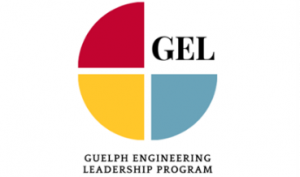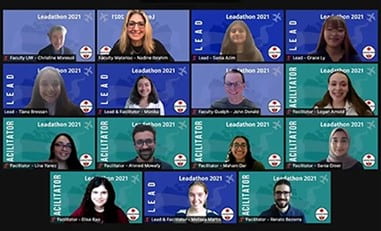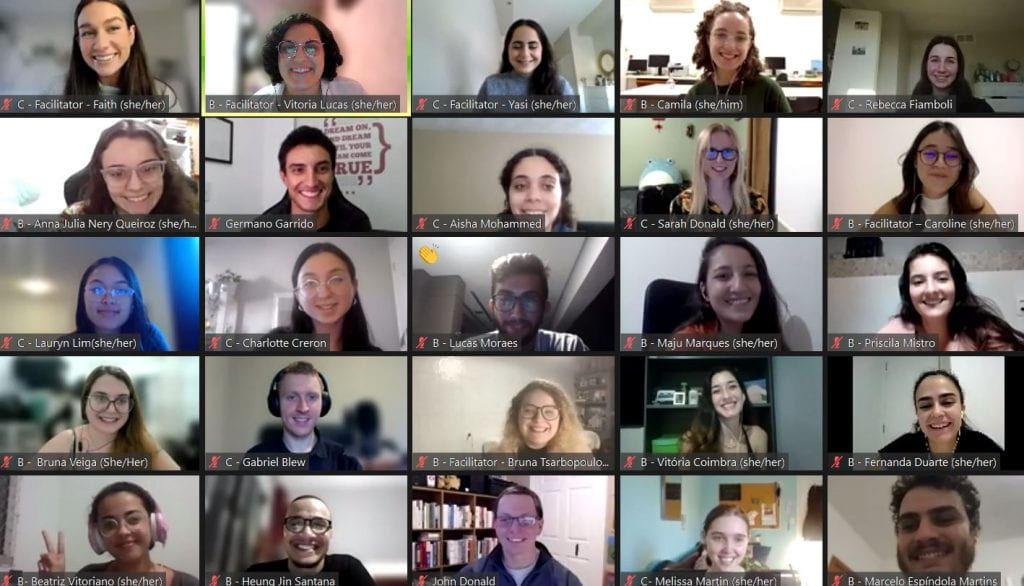
HOW IT BEGAN
The Guelph Engineering Leadership program was launched in 2020, with the motivation to educate and empower students in leadership and to provide leadership opportunities to all interested students. Catherine Dang, a 4th year engineering student at the time, was extensively involved in student leadership and the Engineering Society throughout her undergraduate education. Catherine said she “felt very lucky to have so many opportunities and believed that engineering could only be at its best and most impactful with good, foundational leadership.”
Based on her experience, Catherine did not like the narrow definition of leadership that seemed to be prevalent, observing that “if you weren’t extroverted and loved speaking in front of crowds, people would question your leadership capabilities.” This view highlighted only one type of leader and that leadership opportunities were not always accessible, inclusive, or even attractive to all types of students. Catherine’s main goal at the end of the day was to paint a more inclusive image of leadership. Instead of being exclusive to charismatic presenters with impressive titles, leadership is about having a good set of core values and knowing how to effectively mobilize them.
At the same time, Professor John Donald had established a graduate level course in Engineering Leadership and was looking for opportunities to provide broadly accessible leadership learning experiences to undergraduate students. The idea that emerged was to create a co-curricular engineering leadership program in the School of Engineering. Working with interested students and with the support of the School, Catherine and Professor Donald were able to launch the Guelph Engineering Leadership (GEL) program in September 2020.
CORE PRINCIPLES
1. Broadly Accessible
- The GEL Program is available to every student at any level of student leadership.
2. Student Driven
- Our work values and facilitates peer-to-peer connections with emphasis on student-led initiatives.
3. Growth Mindset
- Our work inspires and develops the mindset to value personal and professional growth equally.
4. Promote Non-Technical Skills
- Our work promotes the graduate attributes of Communication Skills, Professionalism, Ethics and Equity, Individual and Teamwork, and Impact of Engineering on Society and the Environment.
5. Fostering Leadership
- Our work promotes engagement in leadership opportunities outside of the GEL community. Establish the mindset that Engineering is a leadership profession.
6. Interdisciplinary Collaboration
- Develop partnerships external to GEL that align with the program values and mission by offering students the opportunity to engage in interdisciplinary collaboration.
PROGRAM STRUCTURE
The engineering leadership workshops are designed, developed, delivered, and facilitated by Guelph Engineering students. GEL offers 6 co-curricular workshops over the fall and winter semesters, and successful completion of the program leads to a certificate of participation from the School of Engineering (SOE). The program has a unique structure that highly engages students as both leaders and participants at three levels. First in coordinating and delivering the program, second in participation as facilitators of the workshop, and third, as participants in the workshops themselves. The intent is for engineering students to begin to identify engineering as leadership profession. The leadership topics are contextualized to engineering and span the leadership domains of self, team, organization, and society.
y to engage in interdisciplinary collaboration. These partnerships were well-received as students enjoyed the opportunity to network outside of the School of Engineering. In addition to that, the GEL team also connected, in the form of interviews, with Guelph engineering alumni that were currently working in STEM related professions and at various stages of their career to gain valuable insights on leadership.
The 2021-2022 program was highly successful, with approximately 200 students from across all years and engineering programs participating in at least one workshop, and over 100 students completing the program and receiving certificates.
2021-2022 GEL YEAR 2
In 2021-2022, the GEL program continued with the development and delivery of 6 new workshops Click here to see the GEL team for 2021-22. New collaborations extended beyond the School of Engineering to include students from the University of Waterloo, University of Manitoba, and University of Calgary.
The workshops that were delivered in the 2021-22 offering of GEL are as follows:
1. Self Awareness & Self Leadership
2. Team Dynamics & Conflict Resolution
3. Time Management – In collaboration with the Personal Development Seminar
4. Organizational Leadership (with University of Calgary)
5. Exploring Indigenous Ways of Knowing in Engineering (with University of Waterloo)
- Guest speakers – Dr. Kim Anderson and Samantha Mehltretter
6. Marketing Your Confidence & Experiences (with Lang School of Business)
YEAR 2 TESTIMONIALS
“It’s really important to sit back and listen to those around you. What you may think is the truth may not be someone else’s truth since they were taught a different way. By decentering yourself and listening to others and their views/opinions/knowledge of things you can broaden your view and grow as a person.”
5th Year Mechanical Engineering Student
“I learned that everyone has skills to share, and it is important to be able to clearly and confidently market yourself. There are strategies you can take (such as using the STAR method) to help you achieve these goals. I will apply this in my life by taking steps to recognize the value of my contributions and thinking about them using the STAR approach to explain this value to others.”
4th Year Environmental Engineering Student
ADDITIONAL EVENTS
LEADATHON 2021:
On November 6th, 2021, the University of Guelph and the University of Waterloo hosted the first engineering Leadathon. The purpose of the Leadathon was to:
1. Enhance student understanding of the leadership mindset required to solve the complex socio-technical challenges the world is facing today.
2. Build awareness around Canadian Engineering Grand Challenges (CEGCs).
3. Develop leadership skills to create creative and sustainable solutions through collaboration with students across the country.

The 33 student teams participating in the Leadathon were asked to create a ‘Decade of Action’ plan to address a selected CEGC to make Canada a better place. Teams had an hour and a half to create, finalize and submit their ‘Decade of Action’ plan. They focused on creating relevant, creative, and realistic solutions and goals to address a selected CEGC while keeping design and communication in mind for their submission. All teams prepared engaging presentations with well structured goals and solutions, impressing the judges with their creativity and innovation.
CREATING CONNECTIONS AND EMBRACING CULTURAL PERSPECTIVES 2022: CANADA AND BRAZIL
On March 29th, 2022, a team of students and professors from the University of Guelph, the University of Manitoba and from the Instituto Semear in Brazil, developed and delivered GEL’s first international workshop. This special edition GEL workshop was called “Creating Connections and Embracing Cultural Perspectives”.
Students were provided with an opportunity to expand their leadership journey, interact with people of different cultural backgrounds, and explore a new model for effective communication. The workshop covered three main topics, and consisted of main room content led by the facilitators and interactive breakout rooms, where students were able to participate in activities.
The topics covered included:
- Understanding what culture is.

- Noticing and listening when communicating with others.
- Asking good quality questions.
There were 14 Canadian students and 20 Brazilian students that participated in the workshop and contributed to its success. Many participants that attended shared that they would love to join another workshop like this and wish they had even more time to interact with students from other countries!
CONTACT US
Website: www.gel.uoguelph.ca
Instagram: @gel.uog
LinkedIn: Guelph Engineering Leadership Program
Email: gelinfo@uoguelph.ca

